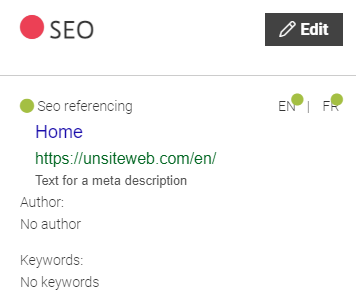SEO
Last updated on 2023-03-03SEO (Search Engine Optimization) plays a big role in browser results and gives your website better visibility among users. If SEO is well positioned on your website, you can benefit from good ranking on the most popular browsers (i.e. Google, Safari, Mozilla Firefox, etc.).
Through the page builder, SEO is the 2nd icon on your menu. From all content pages, the icon is accessible and quick to fill. It is important to fill the SEO of all your pages to ensure optimal organic referencing.

SEO Basics
As mentioned above, SEO is the abbreviation of Search Engine Optimization. This tool allows for structuring, prioritizing, and simplifying the content of a website that is presented to search engines. Search engines can then determine the position of pages in the results of a given search. The stronger the SEO of our website, the more the content will be favored by search engines (depending on the results desired by the user).
How can I ensure that my website's SEO is performing well?
Content structure
HTML tags are used to structure page content to make it easier to read (and analyze) your content by search engines.
Thus, when building a page, it is important to follow a logical structure between titles, subtitles, and content paragraphs. We use the Hn tags to hierarchize the content. H1 will be the title of the page, while H2 will be all section titles. H3 could be used to display subtitles, for example. And so on for all Hn available in your page builder.
By structuring the page in this way, search engines can better understand the main themes and place pages in specific search results.
Metadata structure
Each page of your website must contain metadata to ensure good SEO. This data will also be displayed in the preview of search results from a search engine.
- Meta title: This is the title of the page that will be displayed in search results. This meta title should not exceed 70 characters and should contain keywords to improve search engine optimization.
- Meta description: This meta description provides a summary of the themes addressed on the page. It should contain between 70 and 150 characters and the main keywords of the page.
Content Writing
Obviously, the content of your website pages should be written with great care. Search engines prioritize pages of content containing a maximum of relevant information, specific keywords, and verifiable references.
Each content page should contain a minimum of 500 words to ensure a clear and detailed explanation of your subject.
Furthermore, Google bases the relevance of content on criteria such as expertise, authority, and reliability.
Do not hesitate to incorporate hyperlinks into your content to support your information and add expert or customer testimonials to prove your reliability.
How to use our SEO tool
- From any content page (via the page builder), click on the SEO icon in the sidebar.
- First, consult the summary of your page to see which elements are missing to complete the SEO. Through each section, you will have a green or red dot depending on the language of the content.

- If the dot is green: the SEO content has been filled for this language.
- If the dot is red: the SEO content is missing (or partially missing) for this language.
- Click on Edit to manage the SEO.
- Fill in all the required fields in all languages of your site:
- Meta title (FR/EN)
- Meta description (FR/EN)
- Meta canonical (FR/EN)
- Meta author
- Meta copyright
- Meta keywords
- OG image
- OG meta title
- OG meta description
- Save the changes.